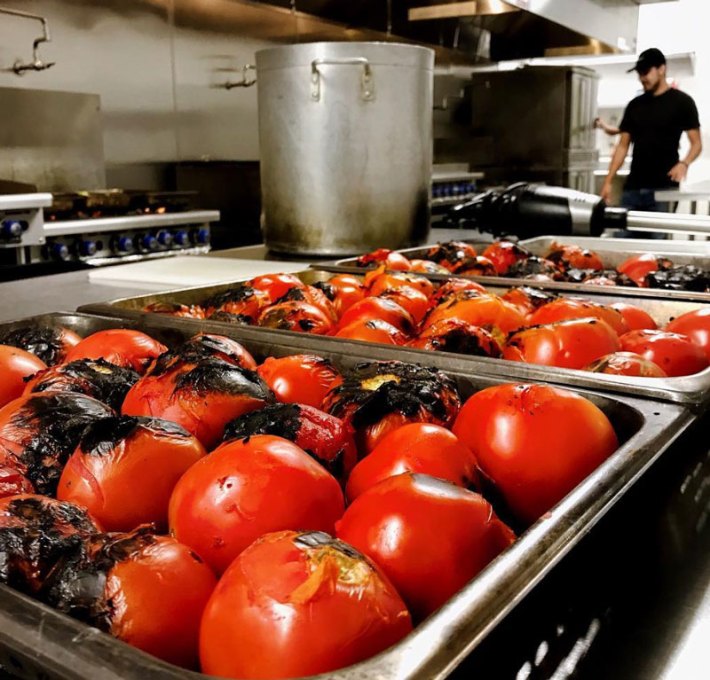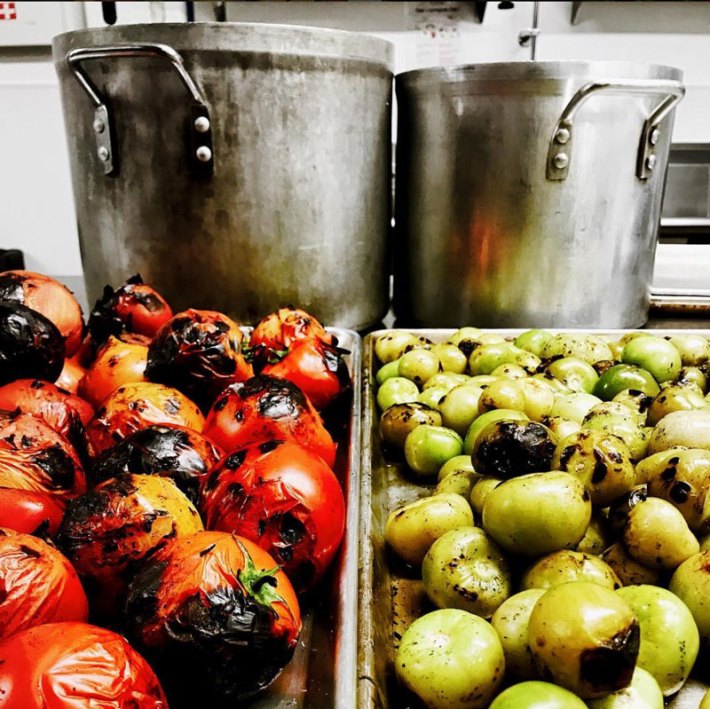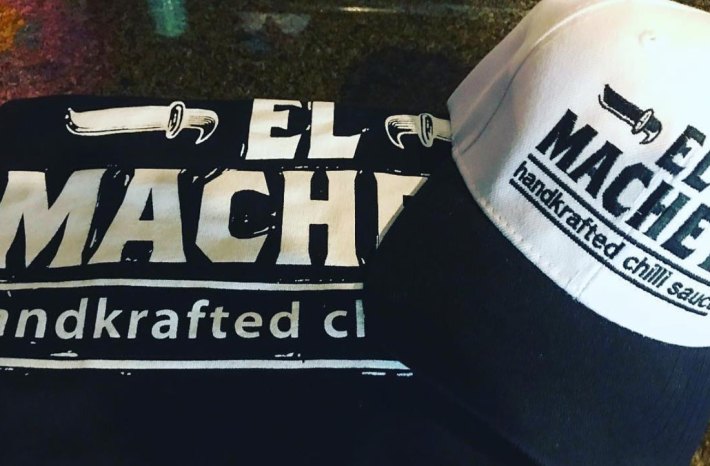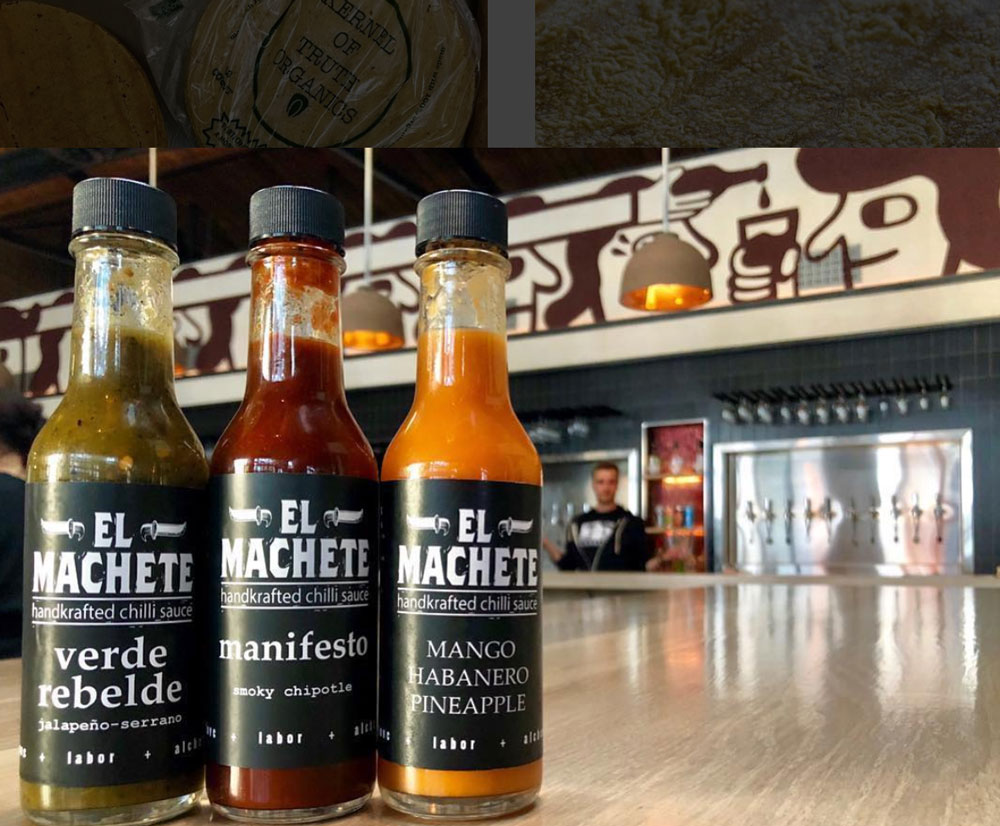[dropcap size=big]O[/dropcap]scar Ochoa grew up in East Los Angeles, in his mother’s kitchen, where as a youngster, Ochoa took it upon himself to learn about making salsas. “It further taught me about flavor profile,” he told L.A. Taco. “That translated to hot sauces later.”
Ochoa is the chef and founder of El Machete, a fledgling but much respected label of handcrafted, locally sourced hot sauces and salsas that sets up every Sunday at the Hollywood Farmers’ Market. El Machete has become a hot-ticket item at many pop-ups, and was even recently featured at LA Plaza’s special ceremony to announce its forthcoming Mexican food museum. El Machete is so popular, Ochoa recently started considering a permanent kitchen space. But its rapid success story was once almost derailed by a barrage of bureaucratic regulations.
The idea for his hot sauce business was equally inspired by his love of cooking, passed down from his mother, and by his formal education. Ochoa has a master’s degree in history from UCLA. On campus, he was particularly inspired by the Mexican Revolution, specifically the art and social movements that took place at the time.

Machete Rising
[dropcap size=big]T[/dropcap]he name El Machete has deep roots in Mexico’s revolutionary history. Ochoa got the name of El Machete from a photograph taken by famed Italian photographer Tina Modotti, showing a group of campesinos reading a newspaper with the name appearing in the masthead. Ochoa hired local Chicano artist Alfonso Aceves to recreate the original masthead of El Machete as the logo for his company.
The first hot sauce he released, a chipotle-style hot sauce made with morita – a smoked jalapeño which is smaller in size – is fiery as it is fruity in flavor. He sold it to friends and family. Even now, he said he still can feel that sense of pride at the quality of the first sauce he was able to produce.
As his business grew he started receiving recognition as well as interest from stores and restaurants who wanted to carry his product. The demand itself was so high he was having to turn away business. He couldn’t meet all the requests due to lack of infrastructure.
At that point, Ochoa had just secured two booths at the Hollywood Farmers’ Market, and applied for a spot at the Pasadena Farmers’ Market. But he hit another snag when the people who run the market asked if he had a cannery license. Then in January of 2018, the California Department Public Health also inquired with about the cannery license, which he did not possess.
“It was a bit overwhelming with everything that I wanted to do,” Ochoa explained.
RELATED: It's Free 99: Your Local, Affordable Holiday Market Gift Guide

Hitting a Snag
[dropcap size=big]C[/dropcap]alifornia's cannery license program has been in existence for almost 100 years, since the period that home canning became popular with the invention of the mason jar. Public health representatives provided Ochoa with information on what he needed to provide, such as filling out an application and providing samples. Ochoa had already begun expanding his offerings from not simply just hot sauces and fresh salsas but also to beans, chimichurri sauces, chili powders, and hot mustard.
According to Ochoa, there were certain regulations that he was unaware were required to make his brand eligible to sell to stores and online. The law requires any business that produces a product with a shelf-life – such as salsa, tomato sauce, or even beverages – to have a cannery license.
Upon receiving his application, CDPH called Ochoa to ask him if he was selling hot sauces. He told him that he was. Unbeknownst to Ochoa, they were using all of this information to build a case against him. Meanwhile, Ochoa’s sauces were sitting on shelves at some of the stores he had sold to the previous year.
In June, the CDPH began confiscating his hot sauces from various stores. Ochoa believes they were getting this information from his social media posts, which he regularly used to promote the locations where El Machete sauces were available. All the while, the same organization was helping him get all of his application materials in order.
“A couple of friends contacted me and said, ‘Hey man some foos came over here and confiscated your shit.’” The following week, he began contacting all of his business partners and informed them there was a chance that would be hearing from the health department as well as expressing his apologies and offering to cover any costs lost in the process.
In all, regulators confiscated El Machete products at six locations.
RELATED: The Last Burgers at Irv's ~ Classic Hamburger Shack Shutting Down After Long Struggle to Survive

At this point, the health department contacted Ochoa asking him to come in for a meeting to ensure that his application will be expedited. Ochoa arrived at the meeting where he met with the person that was helping him with the application, as well as her supervisors from the state level.
To Ochoa, it felt like an ambush. “I went 12 rounds with them," he said. Public health officials produced photocopies of social media posts as well as email exchanges that Ochoa had with them for their proof. “(They) were trying to catch me in some kind of lie,” he said. They then informed Ochoa that they would not fine him, but that he should take the encounter as a serious warning.
He was instructed that he was not able to continue to sell his product without a processed food registry or a cannery license. In order to continue with the cannery license process, he was instructed to take a course about the canning process of his product.

The Comeback
[dropcap size=big]O[/dropcap]choa has since moved his operations from a restaurant to a commissary kitchen at Crafted Kitchen LA, in accordance with being reviewed for a processed food registry license (different from the original cannery license). This allows him to sell his sauces and salsas as a refrigerated item, which is what he does now.
And he's happy. He's got his regulars at the Farmers' Market – and sometimes celebrity customers like Kevin Bacon and Laurence Fishburne – and Ochoa is known all over town for his positive attitude and great salsas. El Machete doesn't just do the bottled hot sauces, his pop-ups also feature salsas, chips, beans, mustards, and even blue corn tortillas from Kernel of Truth Organics.
'How does anyone survive?'
Ochoa feels optimistic but is still worried. “Essentially, I feel like I’m not off the hook,” he explained. “They're going to keep their eye on me. There is a lot of stuff from my labeling to refrigeration, to logs. It seems like it's a challenge for small business owners who have a product they want to get off the ground.”
The costs associated with kitchen space can be prohibitive. At $35 dollars an hour to use kitchen spaces, Ochoa is bemused. “How does anyone survive?”
Ochoa said the Cottage Food bill that was just passed allowing home cooks, will not have any effect on his business. His product is what’s known as an acidified product because it has vinegar as an additive to it to ensure its shelf life. So it’s not protected by the new bill.
As for any advice he has to offer to anyone looking to start a new brand, he says do the research and reach out the CPDH right away. “Inform yourself to the process, and don’t get disheartened since there is a learning curve.”
RELATED: 'We Won!': Street Vendors Rejoice as Los Angeles Finally Makes it Legal







